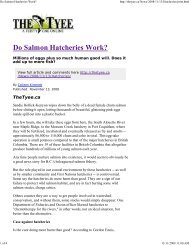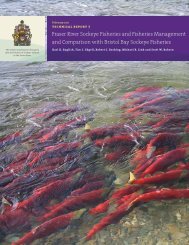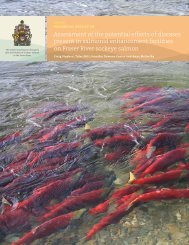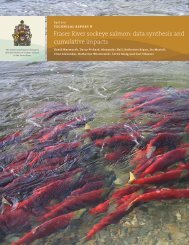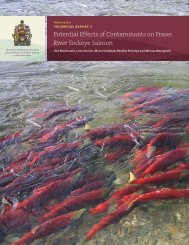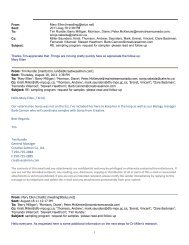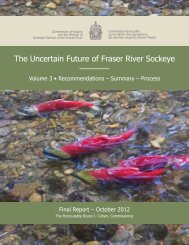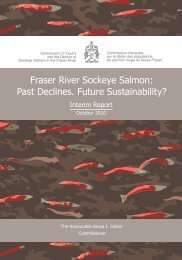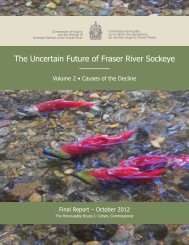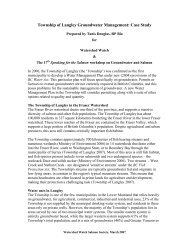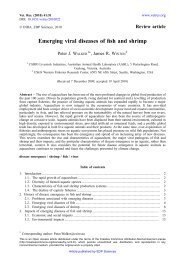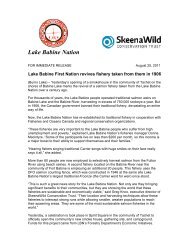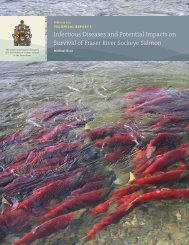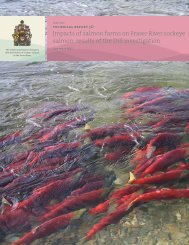The overwhelmingconsensus isthat, at present,far too little isknown aboutenvironmentalimpacts ofaquaculture topermit full-scaleexpansion of BC’saquacultureindustry.practices to decrease the environmentalimpacts of salmon farms;■ The Government of Canada immediatelycreate and implement a comprehensive wildsalmon policy that clearly gives wild salmonpriority in government decision-making;■ Government supervision and regulation ofwild and farmed salmon, especially forhealth and disease monitoring, be centeredon whole bays or large areas of coastline,not on individual farms;■ A <strong>Salmon</strong> Aquaculture Forum, including amulti-stakeholder scientific panel, be establishedto identify public consensus aboutthe future direction of the industry, and toidentify ways to reduce risks to wild salmonfrom net-cage aquaculture.Many meetings of experts occurred in2003/04 (e.g. SFU <strong>Sea</strong> <strong>Lice</strong> Summit, SFU <strong>Sea</strong><strong>Lice</strong> Action Plan Meeting, UBC <strong>Sea</strong> <strong>Lice</strong> Summit).All made recommendations concerningthe management of sea lice. The overwhelmingconsensus is that, at present, far too littleis known about environmental impacts ofaquaculture to permit full-scale expansion ofBC’s aquaculture industry. Specific research prioritiesmust be identified and carried out, allsteps taken by regulatory agencies must rigorouslyapply the precautionary principle, andthere must be improved communication for allinterested and affected groups.5. WHAT RESEARCH IS CURRENTLYBEING CONDUCTED ON SEA LICE?A broad cross-section of scientists from governmentagencies, industry, academic institutions,and environmental organizations inEurope, the UK, and North America is stillstudying the impacts of sea lice and fishfarming on wild fish and the environment.In Europe and the UK, where the link betweensea lice, salmon farms, and wild salmon ismore commonly accepted, [108] research isstrongly focused on finding ways to protectthe last remaining wild salmon from problemsoriginating in fish farms.Unfortunately, North American regulatoryagencies still refuse to recognize what evergrowingevidence and expert opinion throughoutthe world indicates—that sea lice from fishfarms are a serious danger to wild salmon. Inany event, much of the research being conductedby government agencies such as DFOor MAFF remains bogged down trying to determinewhether sea lice from fish farms actuallydo infect wild salmon, or did cause the unnaturallylow pink salmon returns to theBroughton Archipelago.On the positive side, MAFF and DFO now seemto be encouraging academics to address otherconcerns—such as the need for coast-wideplanning and management of fish farm siteswith their surrounding environment [104, 105](especially the benthos), [106] the advantagesof improving monitoring and operating technologies,addressing socio-economic concerns,and learning more about the biology of culturedanimals. The BC Aquaculture Researchand Development Committee was establishedin 2001 to identify and help fund researchopportunities. [107]Results from research conducted in 2003 inthe Broughton Archipelago were recently discussedat a workshop in Alert Bay. The workshopwas hosted by the Inner Coast NaturalResource Centre (ICNRC) and the Centre forCoastal Studies, Simon Fraser University. Academics,conservationists, First Nations, governmentrepresentatives, and local communitymembers attended. [109]20 <strong>Sea</strong> <strong>Lice</strong> and <strong>Salmon</strong>: Elevating the Dialogue
People1. WHAT IS CAAR?CAAR is the Coastal Alliance for AquacultureReform, a coalition of local groups concernedabout how fish farming is practiced in BC andabout the health of wild salmon, coastalecosystems, and coastal people. Membergroups include First Nations, commercialfishermen, and conservationists. WatershedWatch <strong>Salmon</strong> Society is a member of CAAR.For more about CAAR, visitwww.farmedanddangerous.org.2. DOES CAAR OPPOSE FISH FARMS?CAAR does not oppose salmon farming, onlysalmon farming as currently conducted. CAARsupports aquaculture operated in a sustainable,environmentally-conscious manner, andwith the support of local communities andFirst Nations.3. WHAT IS THE PFRCC?The Pacific Fisheries Resource ConservationCouncil (PFRCC) is a government appointed,semi-independent organization created toadvise the governments and citizens of Canadaand British Columbia on conserving andsustaining Pacific salmon stocks and theirhabitat. Council members include experts fromthe scientific and academic community, thecommercial fishing industry, the conservationcommunity, and First Nations. The PFRCC publishesannual reports on the status of wildsalmon, and recommends how to better protectwild salmon. For more information, visitthe PFRCC website at www.fish.bc.ca.4. WHAT IS THE BCSFA?The BC <strong>Salmon</strong> Farmers’ Association (BCSFA) isan organization representing those who workin the salmon farming industry, and includessalmon farmers and service and supply companies.The BCFSA works to protect the BCsalmon farming industry’s market share andinternational reputation. For more information:www.salmonfarmers.org.5. HOW DO FIRST NATIONS FEELABOUT SALMON FARMING?Many of BC’s First Nations believe salmonfarms infringe on aboriginal rights, andoppose fish farms being established in theirtraditional territories. [5] Though a handful ofindividuals have benefited from fish farms,First Nations communities as a whole havenot. Coastal First Nations are dependent onsalmon both as a food source and a livelihood,and are understandably concerned that salmonfarming might threaten their lifestyle, and wildsalmon. Some First Nations communities, suchas the Heiltsuk Tribal Council and the MusgamagwTsawataineuk Tribal Council, have a zerotolerance policy towards fish farms. Thoughother First Nations are less strict, most feelthat fish farming is destructive to wild salmonand the environment. First Nations that doparticipate in the salmon farming industry doso out of a desperate need of employment.Many of BC’sFirst Nationsbelieve salmonfarms infringeon aboriginalrights.Academic, conservation, government,First Nation and community repsat a workshop in Alert Bay.Craig Orr photo<strong>Sea</strong> <strong>Lice</strong> and <strong>Salmon</strong>: Elevating the Dialogue21



